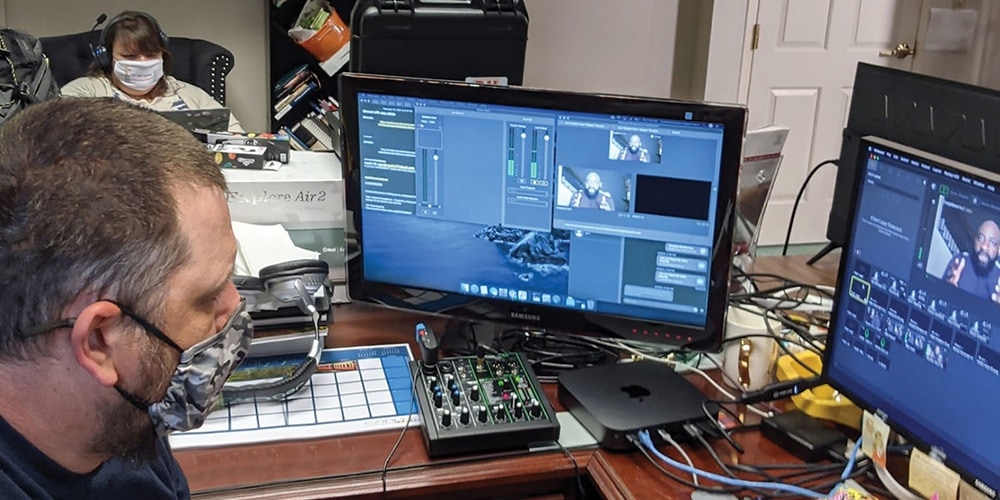
“I want to talk with you about the priority and the burden of evangelism and even the blessings that are afforded to us, even in this very rare and strange season in which we find ourselves.”
Thus began Debleaire Snell, senior pastor of First Seventh-day Adventist Church in Huntsville, Alabama, United States, as he shared the keynote address of the Evangelism Impact 2021 conference earlier this year. A year before, in early 2020, the Carolina Conference Ministerial Department had hosted more than 1,000 attendees at the fourth annual Evangelism Impact at the Landmark Resort in Myrtle Beach, South Carolina.
Carolina Conference Ministerial Council leaders Glen Altermatt, Samuel Romero, and Haskell Williams were determined that Evangelism Impact must continue in 2021, even during the pandemic. “How can we effectively minister in these uncertain times?” Glen Altermatt, evangelism director, asked. “I believe this is a question all churches have been asking this past year. The decision was made to present the fifth annual Evangelism Impact virtually. While our message remains the same, the methods needed to be modified to meet the needs and the times. Experienced evangelists were invited to share what they were doing in the middle of this shutdown.”
“When this thing hit us … none of us were prepared for it,” Snell shared candidly. “We didn’t rightly know how to quantify what was happening. We couldn’t rightly predict what was going to happen. And we all found ourselves in a season of having to adjust, having to adapt.”
“Learning as we go” was a consistent theme of each of the speakers. Richie Halversen, pastor of the Bowman Hills Seventh-day Adventist Church in Cleveland, Tennessee, concurred. “We’re all figuring this out. We don’t have all the answers. But we do know Who does have all of the answers.”
Even in this uncertainty, Snell offered a word of encouragement. Parodying a biblical truism in Ecclesiastes 9:11, he said, “The race isn’t given to the swift, or the battle to the strong, but to those who endure to the end.”
He continued, “The most impactful thing that can happen to somebody is not education, it is not for them to receive wealth, it is not for them to be a part of social programs — the most transforming, powerful thing that can happen to a man or a woman is for them to encounter the power of Jesus Christ, and to have the truth of the living God anchor their hearts and their souls. We have a truth that is designed to reach the world in these dark and evil days.”
Ruben Casabona, pastor and digital specialist, and Rebecca Carpenter, Carolina communications director, teamed with Elias Sandoval, ITS director, and conference employee Tank Brooks, along with the Ministerial Department, as a multi-discipline unit to present Impact virtually from the Carolina Conference studios.
English and Spanish tracks were taking place simultaneously in the same studio and livestreamed on YouTube and Facebook. Additionally, the Spanish presentation was carried on the Carolina-based internet channel, Luz Para Hoy. With the multiple outlets, the numbers reached close to 2020’s in-person meetings and continue climbing due to online archiving of the messages.
Hispanic presenters included Henry Barrios, pastor and ministerial associate for Hispanic Ministries, Florida Conference; Abdiel Del Toro, pastor and general vice president, Florida Conference; and Roger Hernandez, Southern Union evangelism and ministerial director, who also spoke for the English track.
Most of the sessions featured a Q&A session as the final portion of each presentation.
Referring to the disciples’ experience on the Sea of Galilee (Luke 5:5), Halversen reflected, “Maybe you’ve toiled all year and taken nothing…. Maybe nothing your church tried, even before COVID, seemed to work. I believe Jesus is telling us what He told Peter: ‘I want you to let down your net again.’ ”
In his welcome message on Saturday (Sabbath) morning, Leslie Louis, president of Carolina Conference, referenced Joseph Kidder’s book The Big Four and underscored prayer as the primary part of four significant factors in church growth. He then shared the heartfelt passion of Ellen White when she wrote: “A revival need be expected only in answer to prayer. While the people are so destitute of God’s Holy Spirit, they cannot appreciate the preaching of the Word, but when the Spirit’s power touches their hearts, then the discourses given will not be without effect” (Selected Messages, bk. 1, p. 121).
Hernandez emphasized the same theme. “Prayer does not guarantee that the other person is going to change. But it does make it harder for them to remain the same, because we are deploying Heaven’s army,” he said. “It would be a waste — you just lost an hour of your life if you just listen to this and say, ‘That’s nice,’ and went back to your prayerless life. You don’t have to stop your life to pray; you can pray as you live your life. You can infuse prayer into what you do.”
Hernandez explained that when a person wakes up in the morning, they can start by saying, “God, help me to have some divine appointments today. I’m open. How can I interact?” And he added, “So you start your day with a different perspective, going after lost people. When you scan your social media feed, when you interact with people that cut your hair or the person at the gas station, the person who fills your groceries, people you work with, you’re going to start listening for people who are hurting. It’s ‘other-centered’ ministry, saying, ‘Who can I bless today?’ ‘Who can I help today?’ ”
Snell concluded his message with a prayer. “May this gathering be that moment … that we would look back and say this is where Pentecost happened. This is where things changed. This is where the history of our [territory] was rewritten.”
The original version of this story was posted by Southern Tidings.